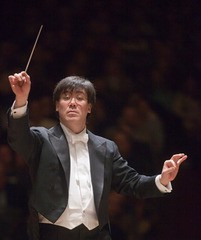|
Back
A Mass Less Ordinary Philadelphia
Verizon Hall, Kimmel Center for the Performing Arts
10/16/2014 - & October 17, 18*, 2014
Jean Sibelius: Night Ride and Sunrise, Op. 55
Antonín Dvorák: The Golden Spinning Wheel, Op. 109
Leos Janácek: Msa glagolskaja
Tatiana Monogarova (soprano), Kelley O’Connor (mezzo-soprano), Anthony Dean Griffey (tenor), John Relyea (bass)
The Philadelphia Singers Chorale, Philadelphia Orchestra, Alan Gilbert (conductor)

A. Gilbert (© Michael J. Lutch)
Any program that features Janácek’s Glagolitic Mass (or Slavic Mass) as its most ‘standard’ repertoire promises to be intriguing. Alan Gilbert, visiting Philadelphia, paired that choral masterwork with two enigmatic, lesser-known programmatic works by composers who are long-proven crowd-pleasers. While the repertoire was undoubtedly interesting, Gilbert seemed intent on playing down each piece’s unusual aspects, resulting in more normalized performance than were expected.
Even under Eugene Ormandy, a fantastic Sibelius conductor, the Philadelphia Orchestra never performed Sibelius’ Night Ride and Sunrise. The piece is unusual in its bipartite fast-slow structure, and its chronology, falling between the crystalline Third Symphony and enigmatic Fourth. The obsessive, proto-minimalist “Night Ride,” with its incessant dotted rhythms, brought out pristine rhythmic playing from the orchestra’s strings, while Sibelius’ rhythmic layering was masterfully controlled by Gilbert. The slow, chorale-based “Sunrise” allowed the orchestra’s homophonic warmth to shine through. The piece never builds to blazing climactic tempests like in later works like the Fifth Symphony or Tapiola, but there was a tangible intensity to the performance, perhaps brought about by the newness of the piece in the orchestra’s repertoire.
While the Sibelius contains the potential of the composer’s later works, Dvorák’s Golden Spinning Wheel comes from near the end of the composer’s working life, a period that saw the Czech master focusing primarily on programmatic music and opera. The gruesomeness of the Karel Jaromír Erben on which the work is based seems toned down quite a bit in the music, which comes across as overly episodic and less convincing than the best of the symphonies or operas. While the overall structure is diffuse, Gilbert and the orchestra gave a strong performance, with the horns’ hunting fanfares and various woodwind solos excellently brought to life.
After intermission, the balcony and stage were filled with the arsenal required to execute Janácek’s stunning setting of the mass ordinary. The work is quite edgy, and it was here that Gilbert most noticeably seemed intent on polishing away any “unsightly” details. The clearest example was in the final movement of the work, the instrumental “Intrada,” which has a raucous trumpet sextuplet figure near its end that is typically hair-raising but was hardly audible in the current performance. There is no doubt that the superb Philadelphia brass could play it out, so the conclusion is that they were instructed not to. Indeed, many such passages seemed muted, lacking the potency of, for instance, Leonard Berstein’s very raw New York Philharmonic recording.
This contrasted with the singing of the Philadelphia Singers Chorale, which was full-throated and, at times, approached being “over the top” in terms of aggression. That said, those moments on the verge were the most memorable. Most effective was the chorus remaining seated for the last "Agnus" in the "Agnece Bozij," making for an ethereal fade-out of the sung portion of the mass.
The soloists were individually excellent but formed an odd quartet. Anthony Dean Griffey and Tatiana Monogarova shared the bulk of the work, and have well-matched voices. Monogarova sang with unceasing intensity and was able to float her voice effortlessly to the top of the composer’s demanding tessitura, while Dean Griffey’s mastery of Britten’s high-lying tenor roles allowed him to shine with a bright, stentorian sound in his stratospheric entries. While these two seemed ideal for this type of oratorio singing, bass John Relyea, while producing impressive power, sounded as if he were channeling Verdi’s Grand Inquisitor. Kelly O’Connor’s small mezzo solos were effectively sung. Michael Stairs seemed to struggle with the intricate organ parts, missing his all-important and dramatic entry in the “Vĕruju” and lacking the rhythmic stability and clarity of playing that make the solo organ “Postludium” an audible master class in layering an ostinato.
Simply getting the chance to hear the Janácek live is a treat and, while the reading lacked the wildness that makes the piece so intoxicating and even risky, the evening as a whole was great exposure to music rarely heard.
Marcus Karl Maroney
|